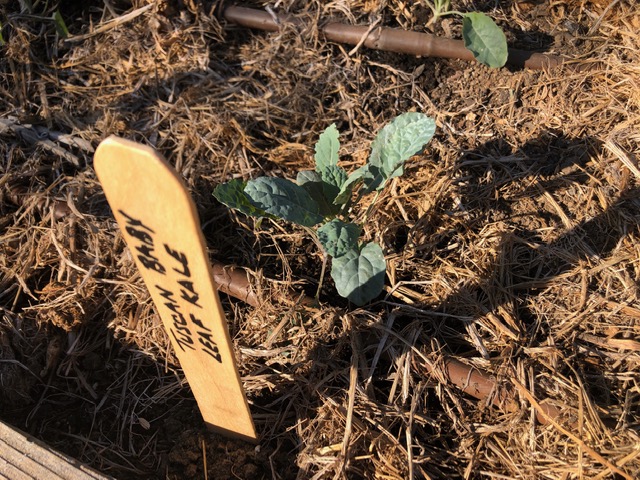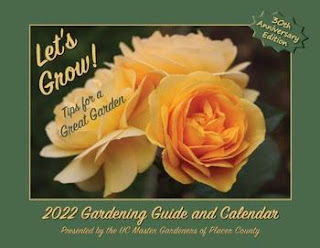
Open garden, classes in-person and on Zoom are scheduled

|
|
At the Sept. 11 Open Garden, check out what's growing in the Fair Oaks Horticulture Center's Vegetable Garden. (Bet there will be kale.) (Photo:
Kathy Morrison)
|
The light is changing, the summer garden is winding down. As planning and planting for fall begin in earnest, gardeners can reap loads of advice from the UCCE master gardeners of the region. While each of the counties has its own program, the advice each group offers is often applicable across the Sacramento gardening area, with some tweaks for microclimates.
Here are some upcoming master gardener classes and events:
--- The Yolo County master gardeners will hold a "Kitchen Garden Chat" this Saturday, Sept. 4, starting at 10 a.m. The master gardeners will discuss "how to finish up your summer garden, what to do with your winter garden and seed saving." The event will be both in person -- at the Leake Room of the Woodland Library -- and on Zoom. The link to join via Zoom is here: https://ucanr.zoom.us/j/95676702285
-- The Open Garden on Saturday, Sept. 11, from 9 a.m. to noon, will be the first by the Sacramento County master gardeners since February 2020. The Fair Oaks Horticulture Center, the MGs' demonstration garden, has undergone several changes since then, including the installation of the beautiful Chuck Ingels Memorial Gate. The FOHC is at 11549 Fair Oaks Blvd. in Fair Oaks.
Master gardeners will be on hand to answer questions about composting, orchard and vineyard care, winter vegetables, berry and herb gardening, and landscaping with limited water. Gardeners with questions can bring samples or pictures of problem plants to the Ask a Master Gardener table. The Gardening Guide and Calendar also will be on sale, for $10. For more information: http://sacmg.ucanr.edu/?calitem=389780
-- Invasive plants! Preventing them is the focus of a "Wild Wanderers" Zoom workshop presented from 10:30 to 11:30 a.m. Saturday, Sept. 11, by the Placer County master gardeners. Learn how to fight "Thugs, Multipliers and Pests," as the MGs call them. Zoom link: https://us02web.zoom.us/j/89053008203? passcode: garden.

|
|
This is the beautiful cover of the Placer master
gardeners' Gardening Guide and Calendar.
|
-- Another valuable Zoom class, "Landscape Transformation," is offered online from 9 a.m. to 10:30 a.m. Saturday, Sept. 11, by the master gardeners of El Dorado and Amador counties. Registration is free but required; to register go here: https://surveys.ucanr.edu/survey.cfm?surveynumber=35346
-- Kathy Morrison
NOTE FOR NEWSLETTER SUBSCRIBERS
Sacramento Digs Gardening plans to change (and upgrade, we hope) our newsletter distribution service soon. Anyone already on our subscription list will be migrated to our new list, but you may be asked to reconfirm your interest in receiving the newsletter version of our blog. The blog itself will stay at its present blogspot address for now, but also will move to a new site later this fall, giving us more flexibility in design and offerings.
Thanks for reading!
Debbie and Kathy
Comments
0 comments have been posted.Sacramento Digs Gardening to your inbox.
Food in My Back Yard Series
April 29: What's (already) wrong with my tomato plants?
April 22: Should you stock up on fertilizer? (Yes!)
April 15: Grow culinary herbs in containers
April 8: When to plant summer vegetables
April 1: Don't be fooled by these garden myths
March 25: Fertilizer tips: How to 'feed' your vegetables for healthy growth
March 18: Time to give vegetable seedlings some more space
March 11: Ways to win the fight against weeds
March 4: Potatoes from the garden
Feb. 25: Plant a fruit tree now -- for later
Feb. 18: How to squeeze more food into less space
Feb. 11: When to plant? Consider staggering your transplants
Feb. 4: Starting in seed starting
Sites We Like
Garden Checklist for week of May 4
Enjoy this spring weather – and get gardening!
* Plant, plant, plant! It’s prime planting season in the Sacramento area. Time to set out those tomato transplants along with peppers and eggplants. Pinch off any flowers on new transplants to make them concentrate on establishing roots instead of setting premature fruit.
* Direct-seed melons, cucumbers, summer squash, corn, radishes, pumpkins and annual herbs such as basil.
* Harvest cabbage, lettuce, peas and green onions.
* In the flower garden, direct-seed sunflowers, cosmos, salvia, zinnias, marigolds, celosia and asters. (You also can transplant seedlings for many of the same flowers.)
* Plant dahlia tubers. Other perennials to set out include verbena, coreopsis, coneflower and astilbe.
* Transplant petunias, marigolds and perennial flowers such as astilbe, columbine, coneflowers, coreopsis, dahlias, rudbeckia and verbena.
* Keep an eye out for slugs, snails, earwigs and aphids that want to dine on tender new growth.
* Feed summer bloomers with a balanced fertilizer.
* For continued bloom, cut off spent flowers on roses as well as other flowering plants.
* Add mulch to the garden to maintain moisture. Mulch also cuts down on weeds. But don’t let it mound around the stems or trunks of trees or shrubs. Leave about a 6-inch to 1-foot circle to avoid crown rot or other problems.